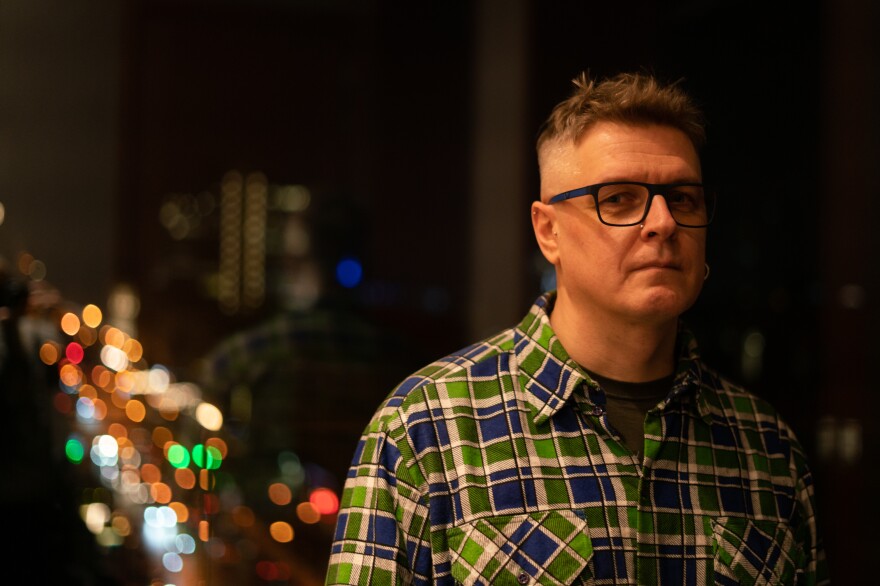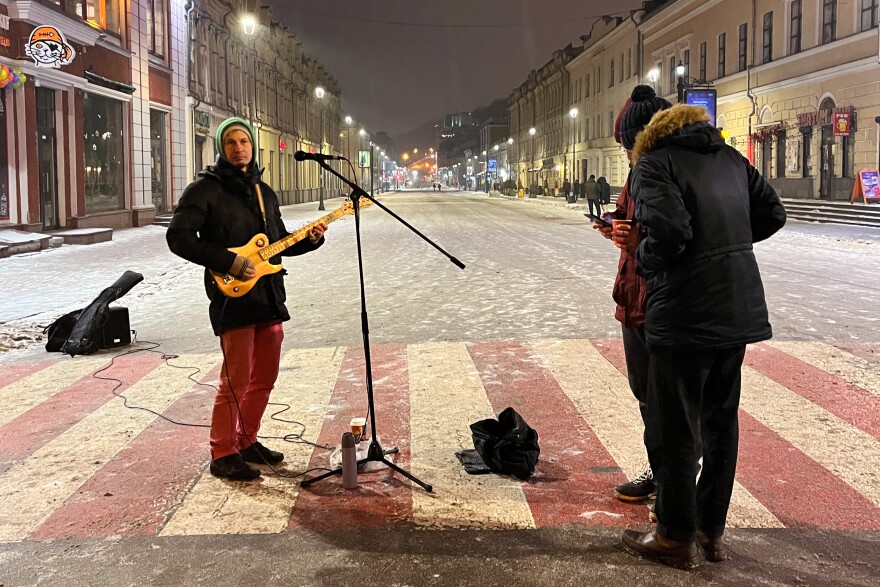KYIV, Ukraine — Anton Slepakov, a Ukrainian electronic musician, used to spend a lot of time recording music in Russia. That was back when he used to sing exclusively in Russian with his former band.
It made business sense. Bigger, richer Russia offered Ukrainian musicians more lucrative gigs, and singing in Russian attracted a deeper pool of fans.
"It didn't bother anyone," says Slepakov, now the lead singer of an underground electronic band called Vagonovozhatye, Russian for "tram drivers."
All that changed after 2014, when Russia invaded Crimea and fueled a separatist rebellion in Donetsk and Luhansk, in Ukraine's eastern Donbas region. That sparked an eight-year war that escalated this week, as Russia sent in troops and asserted the region's independence from Ukraine in an attempt to tear off that part of the country.
In 2014, "We were in talks to play in this very cool Russian club, Chinese Pilot," says the 49-year-old Kyiv-born musician, who wears a screw for an earring. "But during the negotiations, Russia's aggression in Donbas began, and we as a band decided we cannot tour in Russia."
The band backed out of the Moscow gig and has refused to set foot in Russia ever since.
Music has helped Ukrainians assert their identity
Slepakov has joined many of his fellow Ukrainian artists in a cultural boycott of Russia, part of a national project to assert their country's identity as separate from its heavyweight neighbor. It's a response to Russian President Vladimir Putin, who has long claimed Ukraine has no separate national identity of its own and seeks to reassert Russian influence there.

"Modern Ukraine was completely created by Russia," Putin said Monday in an angry speech on Russian state TV.
Slepakov has been vocal in opposing Russia's occupation of Crimea and Donbas. As a result, he recently avoided a flight with a layover in St. Petersburg on his way to play a concert in Finland, fearing possible detention by Russian airport authorities.
He has also given up writing songs in Russian. His lyrics now are exclusively in Ukrainian. The first Ukrainian song he wrote is titled "Where Are You From" — a reference to Ukrainians' soul-searching as they reshape their national identity in relation to Russia.
Some Ukrainian artists continue touring in Russia, but many turn down tempting offers from Russian venues on principle.
"You can't measure everything in money," Slepakov says.
Ukrainian law mandates the use of Ukrainian in print and broadcast media
Russia falsely claims Ukraine is oppressing native Russian speakers. Ukrainians say they're trying to build a national identity.

For centuries, under the Russian empire and then the Soviet Union, Ukrainian was stereotyped as a language of peasants. Russian was promoted as the language of culture.
"We have this thing we call inferiority complex," says Taras Shevchenko, keyboardist and percussionist with Ukrainian electronica-folk band Go_A. "People [who] even didn't hear Ukrainian music, they already think that it's bad and it's not interesting and it's not worth listening to."
Though Russian and Ukrainian share most of the same letters of the Cyrillic alphabet and a lot of vocabulary, they are distinct languages with only about 60% similarity — akin to the similarity between English and Dutch, linguists say.
Unlike English and Dutch, many Ukrainians speak Russian and Ukrainian interchangeably. But legislation prioritizes Ukrainian in public life. In January, by law, all print media switched to publishing in Ukrainian. Russian isn't banned, though publications must also issue equal versions in Ukrainian.
In 2016, legislation dictated that 35% of music on the radio must be in Ukrainian. The law increased popular demand for pop music in Ukrainian.
"I just love this language. This language makes me proud to be Ukrainian," says Go_A musician Shevchenko, who shares his name with Ukraine's 19th century national poet, Taras Shevchenko.
Some bands are reviving old Ukrainian musical traditions
Go_A, which sings exclusively in Ukrainian, represented Ukraine on the main stage last year at Eurovision, the popular European song contest. It was the country's first performance at the competition to be sung entirely in Ukrainian.
The band performed "SHUM," which means "noise" and refers to a traditional springtime folk song of the northern Ukrainian region where Go_A's lead singer grew up. It's also where Chernobyl, the site of a catastrophic 1986 nuclear accident, is located.
"Oh spring song, spring song, where have you spent your winter?" "SHUM" begins.
The nuclear disaster forced residents to abandon their homes, and the band wants to promote the ancient folk music tradition that disappeared in Chernobyl after they left.
"We have our unique culture and our unique traditions, and Chernobyl, it's not only about the catastrophe. It's about people, it's about people's lives," says Go_A's lead singer, Kateryna Pavlenko.
Their Eurovision performance placed fifth and was the runner-up for audience favorite. It has since become a Ukrainian favorite. A street musician played "SHUM" on his flute one recent afternoon in a Kyiv subway station.
Despite the tensions with Russia, Pavlenko says she still receives fan mail from there.
The Eurovision contest has become politicized for Ukrainian performers
Eurovision has become a litmus test as Ukraine tries to assert its own culture. Ukraine's state broadcaster, which oversees the nation's musical entry, rules that contestants must swear off performing in Russia.
In 2019, Ukraine's Eurovision contestant Anna Korsun, known by her stage name Maruv, defended touring in Russia — "Performing concerts is my way of bringing peace," she said — but it sparked controversy and she dropped out of the competition. Ukraine sent no one to the contest that year.
Last week, Alina Pash, Ukraine's pick for this year's competition, also withdrew after word got out that she had performed in Russian-occupied Crimea.
But some Ukrainian musicians still don't mind performing in Russian
Other Ukrainian musicians, though, see no contradiction between their Ukrainian identity and their embrace of Russian language and music.
Close to midnight one recent night on a snowy pedestrian avenue in downtown Kyiv, guitarist Vitaly Abramov played for tips, belting out an old Russian song from the Soviet era about the comfort of a pack of cigarettes.
He was displaced from his hometown in Ukraine's east after it was occupied by Russian-backed separatists in 2014. But he shrugged about singing in Russian on the eve of a potential new Russian attack.
"If you talk Russian, it doesn't mean that you think you are Russian," Abramov said.
His next song, a love ballad, was in Ukrainian.
Jonaki Mehta contributed to this report from Kyiv.
Copyright 2022 NPR. To see more, visit https://www.npr.org.




